
So, my usual M.O. of watching anime as of late has been just watching whatever it is that’s either mostly fell under the radar of the anime community that I’ve been (or just not watching anime entirely *cough*Buffy the Vampire Slayer*cough*it’s pretty good*cough*). Gintama more or less fell into that M.O which is a weird thing to say considering it was one of the most successful anime and manga franchise in Japan and, to a degree, in the “mainstream” anime demographic of the west.
So short impression, I like Gintama. It has some of the most absurd out-of-left-field gag I’ve seen out of….well almost anything. Beyond that, it has a strong entertaining cast of characters, which the series utilized very well, and also surprisingly has a really heartfelt character-driven drama.
I’ve pretty much caught up to the entirety of the old series (including the second movie, which was…..good, I guess?) and are now watching to the 2015 series. Considering how much time I’ve invested, I more or less become familiar about Gintama’s consistent comedic tricks. Tricks which I am now going to share to you to introduce you to the madness that is Gintama.
1) General Absurdism

Gintama’s sense of humor often lean on absurdism in general (and South Park-esque crudeness to a degree). Almost every single joke has out-of-left field non-sequitur punchline. But the thing about absurdism is that you can’t just stop in one place or come up with a new absurd punchline for every single gag. The punchline that you’ve introduced needs to be reiterated and built upon in a new context. That’s often Gintama’s comic trait; Repetition or abuse of a gag until it was distorted and doesn’t make sense, along to their revelation in the most unexpected way.
Take for example, and I’d argue the most memorable episode that exemplify this comedic habit, the patriot episode. The first half episode begins with a group of children wondering what the adults of Gintama does for a living. The first being questioned is Gintoki’s Odd Jobs. Gintoki, being clueless on how to explain Odd Jobs (due to the “we’ll do anything” nature of Odd Jobs and the general lack of customer), he decided to convert his office into, what he called, as a “patriot” production office (the patriot in question being the screenshot above you, yeah I don’t know what that supposed to be either). The children, of course, make fun of this. And as all the other adult characters in Gintama are being questioned one by one, their job description ended up involving the patriot in one way or another.
Mad after being dismissed by children, the adults decided to invite the children into Charlie-and-the-Chocolate-Factory-esque factory to tour to the patriot factory. Complete with the history of the founding of the patriot, the implication there’s rival company out for the “secret”, and the showcase of the patriot production line (with conveyor belts and everything). Even within that large overarching gag, there’s even a sub-gag involving the conveyor belt processes of the patriot which somehow involving the founder past of growing up.
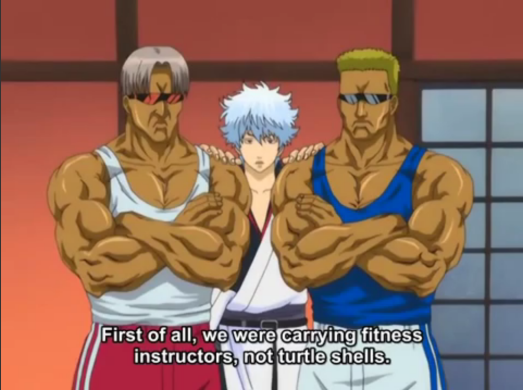
For another example, when Shinpachi and Kagura, Gintoki’s fellow odd-jobbers, decided to underwent a “training arc”, they both came to Gintoki for an advice. Fitness instructor somehow props up in all of their discussion in all form of manner (initially, Gintoki just propose them to hire a fitness instructor). Gintoki’s friend Katsura however, had Shinpachi and Kagura underwent a training similar in Dragon Ball in which two of them need to find a rock with their name written on them while carrying a turtle shell. Gintoki notice this, and change the training to instead find a fitness instructor with their name written on them while also carrying a fitness instructor on their back.
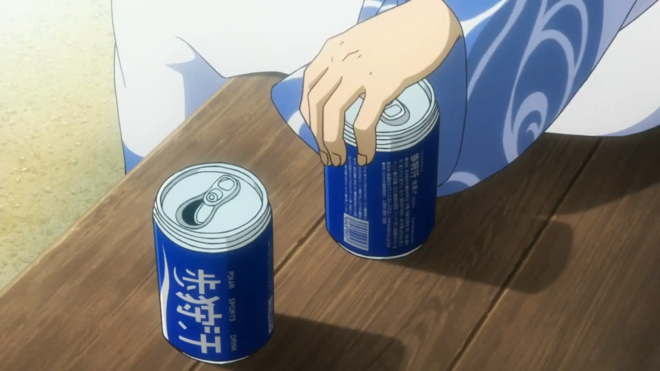
While Gintama often use absurdist repetition for comedy, it also sometimes use for a emotional resonance effect. For example, there’s an episode where Gintoki was attending a Joui reunion with Katsura and Sakamoto. As they were trying to recall that one guy in their army who has low presence, pocari somehow was connected in all of their flashback, until they realize they may have blown up the poor fellow while they were playing kick-the-can with a pokari can.
But when the true nature of the missing guy was revealed, the pocari no longer becomes a gag, but a nostalgic reminder of their long lost friends.
2) Mundane to the Fantastical and The Fantastical to the Mundane
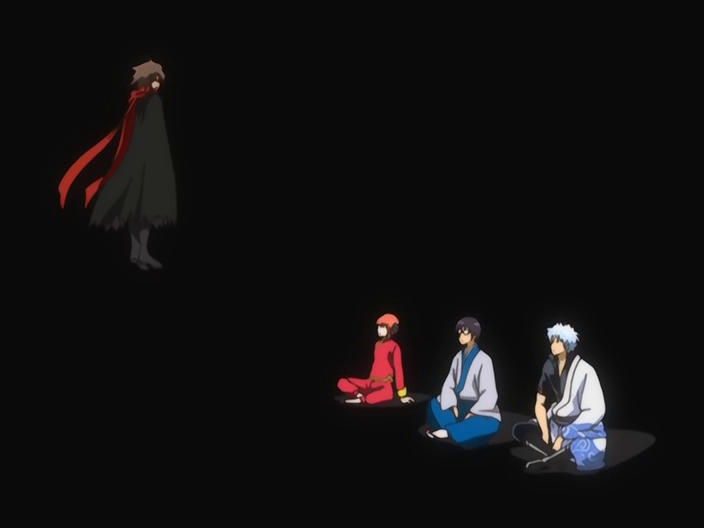
This is the second Gintama’s comedic habit that I want to talked about which to a degree tied to the first comedic habit that I just talked about. Gintama take place in which aliens and all sorts of supernatural phenomenon happens, but one constant throughline was that there were certain elements of the mundanity in all of them. There was a character who is an ultraman parody who decided to confess her feeling to her enemy because she can’t get married (and still living, and hounded, by her mother). There was onmyojis who get into a weather fight because of petty reasons. There was a spirit character inside Gintoki’s sword who turns out is a NEET living with his parents.
There’s also a weird dramatic emphasis for the most mundane thing possible. A hot pot dinner somehow became a battlefield of who get to eat the meat first with wits and strategy, complete with tangible and understandable stakes and variables, and natural solutions arrived through that same variables. Similar thing also happened when the characters argue who can beat the others first in literally wiping their asses in the middle of a fairly serious arc. An argument who gets the short end of a chuppa stick also becomes weirdly a debate with their life hanging in the line.
3) Inventive Parody/Cultural References

This, I suspect, is one of the most notable comedic habit that even people outside of Gintama fandom suspect is what Gintama is all about.
Parody/cultural references are often the most lazily abused type of humor. For one thing it’s easy, just mention some other famous work and high-five the audience for noticing it. Used badly, it’s really less of a humor than it is fanservice.
Which is why I said “used badly” because, much like every other tool in storytellers disposal, it depends on the way you used it. Gintama play with cultural reference in a quite interesting way in some of the episodes.
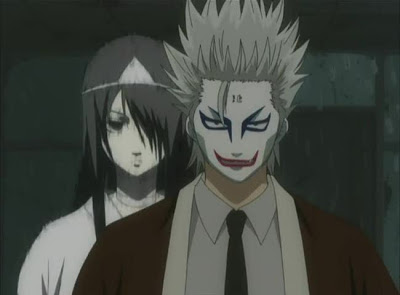
Of course, many of the cultural references and parody in Gintama are just straight parody (“Alien vs Yakuza” for example), but the thing that Gintama done interestingly with cultural reference was that Gintama is very dedicated to it’s references and often making it a somewhat of a jumping platform for it’s absurd gag. Take episode 131 for example, where Gintoki and his friends went to the hot spring inn. Upon stumbling on the possibility that there were ghosts roaming around the inn, in denial, Gintoki remark how they must be a Stand. Okay that’s simple enough.
But as the story goes on, when the truth was revealed that there were, yes in fact, spirits within the inn with the owner as the master of them, the ghosts also started referring themselves as Stands and one of them even mention how if Gintoki wanted to escape, he needs to defeat the inn owner whom the ghost refer to as a Stand Master. So the arc climax becomes a stand-off between stand masters, Gintoki and the inn owner.
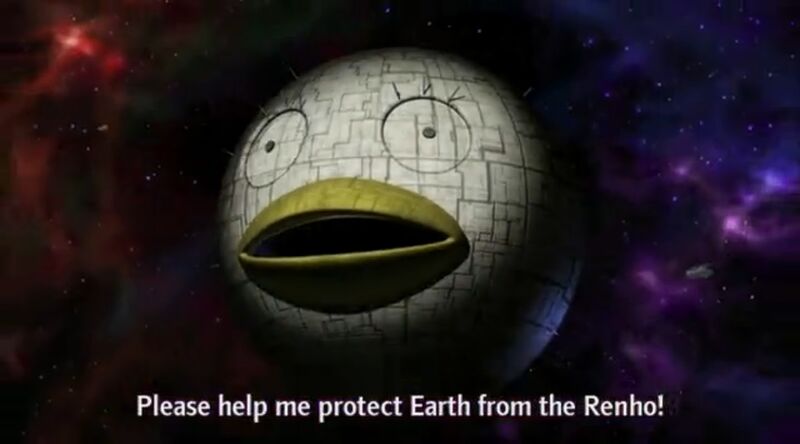
Of course there’s just some episodes where Gintoki just went plain straight mad with it’s cultural references. There’s an entire arc in which Gintoki and crew encountered an Amanto race (Gintama’s version of alien) nicknamed as “The White Devil”. They lived in a Death-Star-esque star system, have a leader whose name was literally “Dark Vader”, and as we delve into the episode, their secret weapon was literally Gundam.
So yeah, in one arc we have a Star Wars parody, Gundam, and 90’s mecha in general, parody, and even a Fujiko Mine parody. This may seem like Sorachi (the mangaka) just tossing whatever cultural reference he thought of that day and call it an arc (to a degree it does feel like that), but what kept it from being entirely a hodpodge mess was that the parodies was introduced gradually throughout the arc and, like I said previously, Gintama really stick with these ideas throughout the entire arc.
4) Fourth Wall Breaking

This is the last habit that I want to talk about. In Gintama’s world, it isn’t so much fourth wall breaking as it is there’s literally no fourth wall. On it’s comedic segments, Gintama’s characters are constantly aware that they are performing in front of an audience. What kept this, along with all the parodies, from come across as a fanservice-y and smug however, was the fact that from it’s execution and constant iteration of those gags, it makes fourth wall breaking and parodies just part of Gintama’s crazy world.
And much like the parodies, rather than settling with pointing out that fact, Gintama’s play around with the idea that the characters are aware that they are in a show. Several episode are just characters giving a recap while commenting they are getting close to catching up to the source material or lacking “budget”. There’s two arc which premised itself with this idea, Popularity Polls and Kintama arc, with the former being comedic and the latter surprisingly touching and thematically solid.

In particular, I want to talk about Popularity Polls arc whose premise, as the name suggest, based on the fact that the characters in the show aren’t happy with how the characters popularity poll are turning out. Some characters decide to embarrass one another in order to increase their rank, some decided to join forces so they all can be in the same rank, and other even decided to take out the author themselves so that no new popular characters are introduced. There’s an introduction of a premise, and afterwards there’s an escalation of the situation with characters behaving in accordance to their personalities.
Note the fact that there is one connecting throughline in each comedic trait which is the fact that there’s natural escalation on each ideas/gags and, to a larger point, a certain craft in executing those ideas/gags, which I think is important to point out. I know that some people like to say that Gintama is a pretty mindless comedy and due to the random nature of Gintama it’s easy and understandable to make that statement, but it’s also a statement I find quite simplifying and does disservice to the entire franchise because a) completely random comedy sounds like stuff that would get boring pretty fast and b) it’s not like Sorachi just pulled every random idea out of his ass and toss it to paper. There’s a certain craft involve in making randomness comprehensive and audience could actually laugh at. Gintama’s overall popularity and successes is pretty much a statement to that fact.
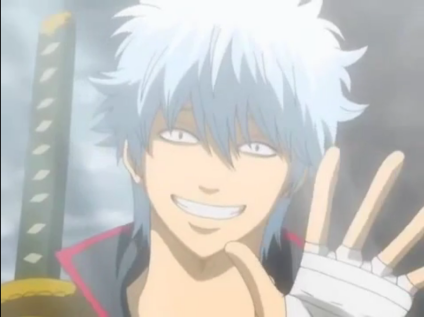
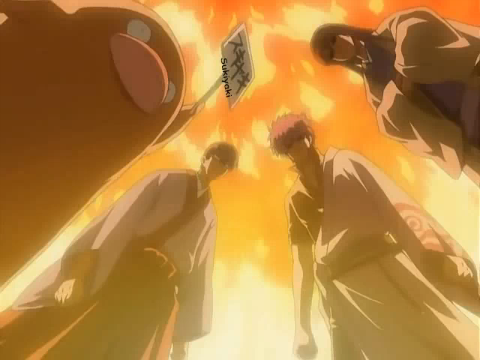
This is a very nice post that summed up Gintama’s comedy quite well!
I suppose one key point that makes Gintama’s humor works is that they are really committed to it, sometimes perhaps a little bit too over-committed, even, but it works for the show. I also think using references are kinda lazy, but again, Gintama works by committing to them to almost abnormal levels. Quite a lot of anime just makes references but Gintama is one among few shows that is a legit “parody”. The hot spring inn arc is one of the best example, together with the episode where Hijikata is looking for a place to smoke.
LikeLike
Thanks for the complement! It meant a lot coming from Gintama’s fans
Yep, Gintama does feel like it is genuine parody. Not all of them works, but it certainly tries!
LikeLike
This is spot on! You’ve broken down the Gintama formula quite nicely. I’ve watched enough Gintama to notice the tropes but couldn’t atriculate it as well as you have.
I enjoy writing stories and wanted to implement a bit of the Gintama comedy into my writing but didn’t know where to start. As you’ve stated the Gintama comedy can seem quite random at times, but I knew there was more to it than that.
Thanks again for your insight. This is really going to help me with my writing. Breaking down Gintamas’ comedy into these four sections is really helpful.
I really do love Gintama and wish to learn how to write like Sorachi, I sit in awe and admire his creativity and genius every time I watch an episode.
If it’s not too much trouble and you have some helpful tips would you be able to contact me?
My email address is sahar.abd64@gmail.com
I’d love to know what other thoughts you have about the Gintama comedy.
LikeLike
Sure thing! If you wanna ask anything just send an email to namhurildaf@gmail.com
LikeLike